

12 Mistakes Nearly Everyone Who Writes About Grammar Mistakes Makes. There are a lot of bad grammar posts in the world.

These days, anyone with a blog and a bunch of pet peeves can crank out a click-bait listicle of supposed grammar errors. There's just one problem -- these articles are often full of mistakes of one sort or another themselves. Once you've read a few, you start noticing some patterns. Inspired by a recent post titled "Grammar Police: Twelve Mistakes Nearly Everyone Makes," I decided to make a list of my own. 1. 2. 3. 4. 5. 6. 7. AfterTheFirstDraft. Dr. Doyle's Editorial and Critique Services.
Expanded Power Revision Checklist. Would you like to be a published poet?
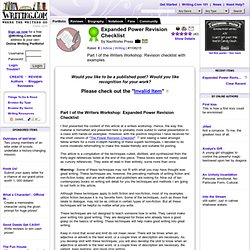
Would you like recognition for your work? Please check out the "Invalid Item" Part I of the Writers Workshop: Expanded Power Revision Checklist I first presented the content of this article at a writers workshop. Hence, the way this material is formatted and presented here is probably more suited to verbal presentation in a class with hands-on examples. And seeing a need amongst fellow writers for a more in-depth handling of these superb techniques, I decided to do some moderate reformatting to make this reader-friendly and suitable for posting. This article is a compilation of the techniques culled, distilled, and synthesized from the thirty-eight references listed at the end of this piece. Warning: Some of these techniques may not fit with what you may have thought was great writing.
Although these techniques apply to both fiction and non-fiction, most of my examples utilize fiction because it is my favorite form. Where Should a Second Chapter Start? On October 12th, 2010 by Fiction Editor Beth Hill and last modified on October 12, 2010 We’ve all read advice about the first chapter—how and where to begin a story; what makes for strong openings, depending on the genre; what not to include in the first paragraph or page of chapter one; what to include in a novel’s opening.
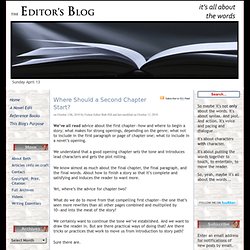
We understand that a good opening chapter sets the tone and introduces lead characters and gets the plot rolling. We know almost as much about the final chapter, the final paragraph, and the final words. About how to finish a story so that it’s complete and satisfying and induces the reader to want more. Yet, where’s the advice for chapter two? What do we do to move from that compelling first chapter—the one that’s seen more rewrites than all other pages combined and multiplied by 10—and into the meat of the story?
We certainly want to continue the tone we’ve established. Edit Your Shit, Part Three: The Contextual Edit. If you were to print out your manuscript, it would seem that your story was neatly bordered by the pages in frame it — like an apparition trapped in a box by intrepid ghostbusters, it feels contained.

Bzzt. Wrongo. Your manuscript is like a cell phone. It emits invisible voodoo. Wonder why you have some kind of testicular buboes? Edit Your Shit, Part Two: Editing For Content. Edit Your Shit, Part One: The Copy-Edit. Like I said on Monday (“Welcome to Editordome“), it’s best to attack your edits like it’s a layer cake: First layer: the icing.
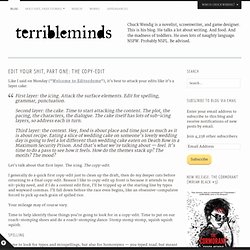
Attack the surface elements. Edit for spelling, grammar, punctuation. Second layer: the cake. Time to start attacking the content. Let’s talk about that first layer. I generally do a quick first copy-edit just to clean up the draft, then do my deeper cuts before returning to a final copy-edit. How To Karate Your Novel And Edit That Motherfucker Hard: A No-Foolin’ Fix-That-Shit Editing Plan To Finish The Goddamn Job. Let’s get something out of the way: Editing is writing.
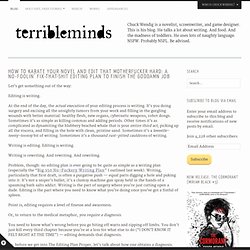
At the end of the day, the actual execution of your editing process is writing. How to Revise A Novel. I’m revising my current novel right now, and I got to thinking about what a pain it can be to get the thing right.
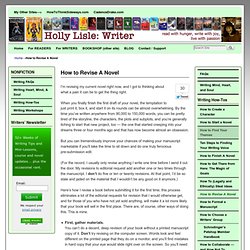
When you finally finish the first draft of your novel, the temptation to just print it, box it, and start it on its rounds can be almost overwhelming. By the time you’ve written anywhere from 90,000 to 150,000 words, you can be pretty tired of the storyline, the characters, the plots and subplots, and you’re generally itching to start that new project, too — the one that started creeping into your dreams three or four months ago and that has now become almost an obsession.
But you can tremendously improve your chances of making your manuscript marketable if you’ll take the time to sit down and do one truly ferocious pre-submission edit. (For the record, I usually only revise anything I write one time before I send it out the door. My revisions to editorial request add another one or two times through the manuscript.
Editing services. Manuscript Editing Software - AutoCrit Editing Wizard. Blood-Red Pencil. Why All Self-Publishers Need a Good Editor. "Just get it down on paper, and then we will see what to do with it," said Maxwell Perkins, the revered editor of F.
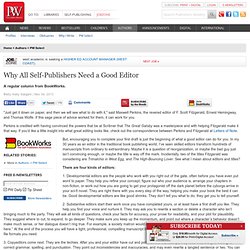
Scott Fitzgerald, Ernest Hemingway, and Thomas Wolfe. If this sage piece of advice worked for them, it can work for you. Perkins is credited with having convinced the powers that be at Scribner that The Great Gatsby was a masterpiece and with helping Fitzgerald make it that way. If you’d like a little insight into what great editing looks like, check out the correspondence between Perkins and Fitzgerald at Letters of Note. Become an Editor. Project Team Beta. Abbreviations, capitalization, punctuation, grammar, numbers, spelling, word usage. Do you have writing questions about abbreviations, addresses, capitalization, English grammar, Internet terminology, numbers, plurals, possessives, punctuation, spelling and word usage?
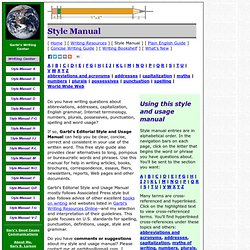
If so, Garbl's Editorial Style and Usage Manual can help you be clear, concise, correct and consistent in your use of the written word. This free style guide also provides clear alternatives to long, pompous or bureaucratic words and phrases. Writing and Book Editing Software. Welcome to Renaissance Wordsmith! EditMinion. Editorial Services. Pro Writing Aid - Writing Improvement & Editing Software.